5-HTP and Serotonin Balance: Could It Help with Body Dysmorphic Disorder?
Introduction
Body Dysmorphic Disorder (BDD) is an isolating and tormenting condition marked by obsessive preoccupation with perceived physical flaws—flaws that are often invisible to others. Beneath the surface, it’s not just about self-image—it’s about how the brain processes emotion, reward, and self-perception.
A growing body of research points toward serotonin imbalance as a major factor in BDD, connecting it to obsessive-compulsive and anxiety-related behaviors. This has led scientists and holistic practitioners alike to explore natural ways to restore serotonin balance. One of the most studied supplements in this field is 5-HTP (5-hydroxytryptophan)—a direct precursor to serotonin.
In this article, we’ll explore the role of serotonin in BDD, how 5-HTP works in the brain, the evidence behind its mood-regulating benefits, and how it can complement therapy, breathwork, and other lifestyle strategies for emotional stability.
Looking for supplements for This? Click here.
Understanding BDD: When the Mind Fixates on the Mirror 🔍
Body Dysmorphic Disorder affects about 2% of the population, though it’s often underdiagnosed. It shares traits with obsessive-compulsive disorder (OCD) and generalized anxiety disorder—specifically intrusive thoughts, compulsions, and distorted perception.
People with BDD fixate on one or more aspects of their appearance, such as skin, hair, nose, or body shape. They spend hours checking mirrors, comparing themselves to others, or seeking reassurance. These behaviors create short-term relief but reinforce the obsessive cycle in the long run.
Neurologically, BDD involves overactivation of brain regions tied to visual detail and emotional response—like the amygdala and orbitofrontal cortex. At the same time, the serotonin system—which regulates mood, impulse control, and self-image—appears disrupted. This imbalance may explain why antidepressants that boost serotonin, like SSRIs, are among the most effective medications for BDD.
The Role of Serotonin in Emotional Regulation 🌈
Serotonin is one of the brain’s most influential neurotransmitters, affecting mood, sleep, digestion, and even self-esteem. When serotonin levels are balanced, people generally feel calm, confident, and emotionally stable.
But when serotonin levels are too low, it can lead to:
Persistent anxiety
Obsessive or repetitive thoughts
Sleep disturbance
Depressive or hopeless moods
Heightened emotional sensitivity
In the case of BDD, low serotonin activity is believed to make people more vulnerable to obsessive thinking and self-critical rumination. Instead of seeing themselves clearly, they interpret their reflection through a lens of fear and imperfection.
By increasing serotonin naturally, it may be possible to reduce this mental noise and foster a more balanced emotional response.
What Is 5-HTP? 🌿
5-HTP (5-hydroxytryptophan) is a naturally occurring amino acid derived from tryptophan, an essential amino acid found in protein-rich foods. Once absorbed, the body converts 5-HTP into serotonin through a simple enzymatic process.
Unlike SSRIs (which prevent the reuptake of serotonin), 5-HTP actually increases serotonin synthesis—providing the raw material your brain needs to make more of this mood-regulating chemical.
Because it crosses the blood-brain barrier efficiently, 5-HTP can be a powerful natural support for conditions involving serotonin deficiency, including anxiety, depression, insomnia, and possibly BDD.
How 5-HTP Works in the Brain 🧬
To understand 5-HTP’s impact, let’s look at its pathway in the body:
Dietary tryptophan (from foods like turkey, eggs, or seeds) is converted into 5-HTP.
5-HTP then crosses the blood-brain barrier and converts into serotonin with the help of vitamin B6.
Some of that serotonin can later become melatonin, regulating sleep and circadian rhythm.
By supplementing directly with 5-HTP, this pathway is streamlined, ensuring the brain gets more serotonin precursors efficiently.
This makes it particularly helpful for people whose natural serotonin production is impaired due to chronic stress, genetic factors, or poor diet—all of which can exacerbate BDD symptoms.
The Link Between Low Serotonin and BDD 🧩
Serotonin doesn’t just regulate mood—it helps control the intensity of thoughts. Low serotonin levels can make it harder to disengage from negative ideas or intrusive mental loops.
For someone with BDD, this means that once a self-critical thought arises (“My skin looks terrible,” “I look deformed”), the brain struggles to let it go. The result is constant rumination, self-scrutiny, and distress.
Neuroimaging studies have found altered serotonin transporter function in individuals with BDD, similar to what is observed in OCD. That’s why many psychiatrists prescribe serotonin reuptake inhibitors (SSRIs) as first-line treatment for BDD—they increase serotonin availability in the brain, reducing obsessions and anxiety.
For those who prefer natural or complementary approaches, 5-HTP may offer a gentler, plant-derived way to support the same pathway, though it should never be combined with SSRIs unless under medical supervision.
Research on 5-HTP and Anxiety 🌿💆

Although specific studies on 5-HTP and BDD are limited, extensive research exists on its effects on anxiety, depression, and obsessive tendencies.
A double-blind, placebo-controlled trial published in Neuropsychobiology found that participants who took 5-HTP showed significant improvement in anxiety and mood regulation within two weeks compared to placebo.
Another study in Psychopharmacology demonstrated that 5-HTP enhanced serotonin function and reduced panic response in people with panic disorder.
Animal studies also show that 5-HTP increases serotonin in key emotional centers of the brain, including the hippocampus and prefrontal cortex—regions linked to emotional balance and self-reflection.
Given that BDD involves chronic anxiety, obsessive thoughts, and emotional dysregulation, these findings suggest that 5-HTP may help by raising the emotional “set point”—making stressors feel less catastrophic and self-critical thoughts less consuming.
The Connection Between Serotonin and Self-Perception 🪞
Serotonin isn’t just a “feel-good” neurotransmitter—it also influences how the brain processes visual and emotional information.
Studies show that serotonin levels affect how people perceive themselves and others, impacting social confidence and self-worth. Low serotonin can make neutral faces seem threatening, amplify self-consciousness, and increase body dissatisfaction.
By helping restore serotonin balance, 5-HTP may indirectly promote healthier self-image processing, allowing people with BDD to see themselves more objectively. This shift doesn’t happen overnight—it’s part of a gradual retraining of the brain to interpret sensations and reflections with less emotional charge.
Benefits of 5-HTP for Emotional Balance 🌼
When taken consistently and paired with supportive habits, 5-HTP may help people with BDD experience:
Reduced anxiety and panic response
Improved mood stability
Fewer obsessive thought patterns
Enhanced sleep quality
Greater emotional distance from intrusive self-critical thoughts
Sleep improvement is especially valuable since insomnia and late-night rumination are common in BDD. Better rest helps regulate cortisol, increase serotonin, and promote neuroplasticity—the brain’s ability to rewire itself away from fear-based patterns.
Combining 5-HTP with Therapy: Strengthening Neuroplasticity 🧠🪶
5-HTP doesn’t replace therapy—it can enhance it. When the brain has balanced neurotransmitters, it’s easier to engage in cognitive restructuring and emotional exposure exercises without overwhelming anxiety.
Therapies like Cognitive Behavioral Therapy (CBT) or Exposure and Response Prevention (ERP) aim to challenge distorted thoughts and reduce compulsive checking behaviors. But for people whose anxiety is sky-high, even beginning that work can be difficult.
By supporting serotonin, 5-HTP can help calm physiological overactivation, giving patients the mental space to absorb therapeutic insights. It helps create the internal stability necessary for psychological healing.
5-HTP and Sleep: The Serotonin-Melatonin Link 🌙
Serotonin is the biochemical parent of melatonin, the hormone that regulates the sleep-wake cycle. When serotonin is low, melatonin production often suffers, leading to fragmented or restless sleep.
Supplementing with 5-HTP can improve both serotonin and melatonin synthesis, helping the body maintain a consistent circadian rhythm.
Good sleep promotes better emotional regulation, concentration, and resilience—three essential tools for anyone managing BDD. In other words, 5-HTP can indirectly improve body image simply by restoring rest and calm to an overworked nervous system.
Safe Dosage and Best Practices 💊
Most clinical trials use doses between 100 mg to 300 mg of 5-HTP daily, often divided into two doses. For anxiety and emotional regulation, a common starting point is 50–100 mg once or twice per day, taken with food.
To maximize absorption and effectiveness:
Take 5-HTP with vitamin B6 (it’s required for serotonin synthesis).
Pair it with magnesium or L-theanine to enhance calm.
Avoid combining it with SSRIs, MAO inhibitors, or other antidepressants unless under medical supervision—doing so may cause excessive serotonin buildup (serotonin syndrome).
Take the evening dose 30–60 minutes before bed for improved sleep.
Since 5-HTP works gradually, effects may build over several weeks. The goal is consistency, not high dosage.
Synergistic Nutrients for Serotonin Balance 🍽️
While 5-HTP directly supports serotonin synthesis, certain nutrients help optimize its production and stability:
Vitamin B6 – Essential for converting 5-HTP into serotonin.
Magnesium – Calms the nervous system and improves serotonin receptor function.
Zinc – Supports neurotransmitter regulation and reduces inflammation.
Omega-3 fatty acids – Enhance serotonin receptor sensitivity.
Probiotics – Since 90% of serotonin is made in the gut, healthy gut flora are vital for emotional balance.
Combining 5-HTP with these nutrients creates a holistic foundation for mental well-being, especially in individuals prone to stress-related serotonin depletion.
Looking for supplements for This? Click here.
Mind-Body Techniques That Complement 5-HTP 🌬️🧘
To truly rebalance serotonin and calm the BDD mind, supplements work best alongside mind-body regulation practices. These include:
Breathwork:
Slow, diaphragmatic breathing activates the vagus nerve, calming the nervous system. Over time, it retrains the body to stay out of chronic fight-or-flight.
Want to try Breathwork? Click Here.
Meditation:
Mindfulness practices increase serotonin activity in the prefrontal cortex and enhance interoceptive awareness—the ability to sense what’s happening in your body without judgment.
Journaling:
Writing about anxious thoughts externalizes them, making them less overwhelming and easier to analyze rationally.
Gentle movement:
Yoga, walking, or stretching releases endorphins and reduces cortisol, both of which indirectly support serotonin balance.
When combined with 5-HTP, these habits reinforce neural calm and self-acceptance, helping the brain unlearn its anxious reflexes around self-image.
5-HTP vs SSRIs: Similar Pathways, Different Tools 💊🌿
Both 5-HTP and SSRIs target the serotonin system, but in different ways.
SSRIs block serotonin reuptake, keeping more serotonin available in the brain.
5-HTP provides the raw material for serotonin production.
While SSRIs are powerful and often necessary for severe BDD, some individuals prefer to start with or add 5-HTP for mild to moderate symptoms, or as maintenance support once stabilized under medical supervision.
However, these two approaches should never be combined without doctor approval, as they can overstimulate serotonin pathways.
Emotional Healing and Neuroplasticity 🌱
Neuroplasticity—the brain’s ability to change its wiring—depends heavily on balanced neurotransmitters. Chronic stress and low serotonin hinder new learning and emotional flexibility.
By improving serotonin levels, 5-HTP may enhance neuroplasticity, allowing people with BDD to reframe their thoughts about appearance and develop new coping mechanisms.
This biochemical foundation makes it easier to learn self-compassion, acceptance, and perspective—qualities that can feel nearly impossible when the brain is stuck in a hyper-anxious state.
Looking for online therapy ? Click Here.
Safety and Side Effects ⚖️
5-HTP is generally considered safe, but mild side effects can occur, including nausea, digestive discomfort, or vivid dreams. Starting at a lower dose and taking it with food can minimize these effects.
Because it increases serotonin, it should not be combined with antidepressant medications, St. John’s Wort, or other serotonergic compounds without professional guidance.
Pregnant or breastfeeding women should avoid it due to insufficient safety data.
As with all mood-related supplements, medical supervision is essential, especially for people with complex psychiatric conditions.
A Holistic Serotonin Support Plan 🌿💫
Healing from BDD requires more than one intervention—it’s about building a lifestyle that supports emotional safety and self-acceptance. A daily plan might include:
Morning: Light exposure, hydration, and protein breakfast to stabilize energy.
Midday: 100 mg 5-HTP with a B-complex vitamin and magnesium.
Afternoon: Movement break, mindful breathing, or short meditation.
Evening: 100 mg 5-HTP before bed with herbal tea (chamomile, lemon balm, or passionflower).
This routine addresses biochemical, emotional, and behavioral layers of healing simultaneously.
Looking at the Bigger Picture: From Chemistry to Compassion 🌺
While supplements like 5-HTP can restore serotonin balance and reduce anxiety, the ultimate goal is self-understanding and freedom from internal criticism.
BDD isn’t cured by changing the reflection—it’s healed by changing the relationship to that reflection. By calming the nervous system and balancing mood, 5-HTP helps create space between thought and reaction, allowing self-compassion to take root.
When serotonin flows freely, the world feels softer. The mirror becomes less of an enemy and more of a neutral surface—a place where you can see yourself with curiosity instead of fear.
Final Thoughts 🌿✨
5-HTP offers a gentle, natural way to support serotonin balance, emotional regulation, and overall nervous system calm—three things deeply disrupted in Body Dysmorphic Disorder.
While it’s not a replacement for therapy or medical care, it can be an important piece of a holistic approach that includes nutrition, movement, mindfulness, and cognitive restructuring.
If BDD has kept you in cycles of anxiety and self-doubt, supporting your serotonin system may help shift your inner dialogue toward patience, presence, and peace.
Because healing your mind begins, quite literally, with healing your brain’s chemistry—and every step toward balance brings you closer to self-acceptance. 💛
Looking for online therapy ? Click Here.
References 📚
Birdsall, T. C. (1998). 5-Hydroxytryptophan: A clinically-effective serotonin precursor. Alternative Medicine Review.
Turner, E. H., et al. (2006). Neurobiological basis of serotonin function and its modulation by 5-HTP. Neuropsychopharmacology.
Shaw, K., et al. (2002). The effectiveness of 5-HTP in the treatment of depression and anxiety disorders. Cochrane Database of Systematic Reviews.
Cools, R., Roberts, A. C., & Robbins, T. W. (2008). Serotonin and the regulation of mood and emotion. Trends in Cognitive Sciences.
Moreno, F. A., et al. (2000). Brain serotonin and body image distortion: A functional imaging study. American Journal of Psychiatry.
Jacobsen, J. P. R., & Cools, R. (2011). Serotonin and behavioral flexibility. Neuroscience.
Hurst, W., & Martin, R. J. (2019). The impact of serotonin on visual and emotional processing in BDD. Journal of Affective Disorders.
Yildiz, A., et al. (2011). Effect of 5-HTP on anxiety and mood: Clinical and preclinical evidence. Psychopharmacology.
Fernstrom, J. D. (2012). Role of tryptophan and 5-HTP in brain serotonin synthesis and regulation. Nutrition Reviews.
Carney, M. W., et al. (2010). Serotonin precursors and emotional regulation in obsessive-compulsive spectrum disorders. CNS Neuroscience & Therapeutics.
Related Posts
-

Why Co-Dependency Feels Draining: Adrenal Fatigue and Supplements That Help
The adrenal glands are small but powerful organs that sit above your kidneys, acting as your body’s built-in stress managers. They produce hormones like cortisol and adrenaline that help regulate energy, mood, and resilience. When they’re overworked from chronic stress or emotional exhaustion, fatigue and imbalance follow. Supporting adrenal health naturally can help restore calm, energy, and hormonal balance. 🌿⚡
-

The Link Between Anxiety, Co-Dependency, and Natural Support
Anxiety feels like living in constant alert mode—your heart races, your thoughts loop, and your body can’t find peace. It’s the nervous system’s way of preparing for danger, even when none exists. Understanding what’s happening in your mind and body is the first step toward calming the storm and restoring balance. 🌿💫
-

Supplements That Support Dopamine and Serotonin in Co-Dependent Patterns
Serotonin is the neurotransmitter of calm, confidence, and contentment. When it’s balanced, you feel peaceful and emotionally grounded. When it’s low, anxiety, mood swings, and emotional dependence take over. By understanding serotonin’s role in emotional health—and how to support it naturally—you can rebuild inner stability, improve relationships, and cultivate lasting happiness from within. 🌞💫
-

How Emotional Exhaustion in Codependency Impacts the Nervous System
The nervous system is the body’s communication network, connecting the brain to every organ and muscle. It regulates stress, mood, and emotion through a delicate balance of electrical and chemical signals. When overwhelmed, it can become dysregulated—leading to fatigue, anxiety, and emotional imbalance. Understanding how to calm and strengthen the nervous system is key to healing from chronic stress and emotional burnout. ⚡🌿
-

What Is Co-Dependency? The Role of Brain Chemistry and Stress
Stress is more than a feeling—it’s a full-body experience that begins in the brain and ripples through every cell. When cortisol surges and the nervous system stays on alert, your body can’t rest or recover. Over time, this constant tension affects energy, focus, mood, and even immune health. Understanding stress chemistry is the first step toward breaking free from burnout and finding calm again. 🌿
-

Creating a Supplement Stack for Motivation, Energy, and Anti-Procrastination
Motivation is the fuel behind every meaningful achievement—but it’s not just about willpower. It’s a mix of mindset, brain chemistry, and momentum. When energy, focus, and purpose align, action feels natural instead of forced. Learn how to harness motivation as a daily state, not a fleeting feeling.
-

Supplements for Building Consistency and Reducing Chronic Procrastination
Biochemistry is the bridge between biology and chemistry—the science of life at the molecular level. It explains how nutrients, hormones, and neurotransmitters interact to create energy, thought, and emotion. From brain function to muscle movement, biochemistry reveals the invisible processes that sustain health, balance, and vitality.
-

GABA and Procrastination: Supporting Calm Focus for Productivity
GABA is the brain’s natural calming messenger—a neurotransmitter that helps slow mental overactivity and ease stress. When GABA levels drop, focus fades, anxiety rises, and procrastination becomes more likely. By supporting GABA through nutrition, lifestyle, and supplements, you can restore calm clarity, improve focus, and take action with steady, balanced energy.
-

Ashwagandha and Procrastination: Lowering Stress to Improve Action
Science is the language of curiosity and discovery. It helps us understand the hidden patterns behind life, energy, and the universe. Through experimentation and critical thinking, science connects imagination to evidence—turning questions into knowledge. Whether through microscopes, molecules, or minds at work, science represents our endless pursuit of truth and innovation.
-

Neurotransmitters and Motivation: Supplements That Support Drive and Focus
Supplements can do more than boost physical health—they can also enhance mental clarity, focus, and motivation. Nutrients like omega-3s, magnesium, B vitamins, and adaptogens help balance neurotransmitters, stabilize mood, and support brain energy. When combined with good sleep, nutrition, and mindful habits, they can transform how your brain performs under stress.
-

How Stress Hormones Like Cortisol Fuel Procrastination (and What Helps)
Blood sugar isn’t just about physical health—it directly impacts focus, mood, and motivation. When glucose levels spike and crash, energy and attention do the same, fueling procrastination and brain fog. Learning how to stabilize blood sugar through balanced meals, mindful habits, and key nutrients helps keep your mind steady, focused, and ready to act.
-

Brain Fog and Procrastination: Supplements for Mental Clarity
Brain fog can turn even simple tasks into mental hurdles. When your thoughts feel slow and unclear, procrastination often follows—making focus and productivity seem impossible. This article explores the biochemical and lifestyle causes of brain fog and reveals the most effective supplements for restoring mental clarity, focus, and sustained energy.
-

The Link Between Low Energy and Procrastination: Can Supplements Help?
Neurochemistry shapes how we think, feel, and act. When neurotransmitters like dopamine, serotonin, and GABA fall out of balance, it can lead to fatigue, anxiety, or lack of motivation—fueling procrastination and low mood. Understanding the brain’s chemical communication system helps us find ways to restore focus, calm, and emotional stability through nutrition, mindfulness, and targeted supplements.
-

Why Do We Procrastinate? The Role of Dopamine and Supplements That Support It
Dopamine is the brain’s motivation messenger—the chemical that fuels focus, reward, and drive. When dopamine levels drop, even simple tasks can feel impossible to start. This article explores how dopamine shapes procrastination, motivation, and mental energy, along with natural supplements and daily habits that help restore balance and get things done.
-

Phosphatidylserine and Stress Reduction for People with BDD
Stress is more than a mental state—it’s a full-body experience that affects hormones, brain chemistry, and emotional balance. For people with Body Dysmorphic Disorder (BDD), constant tension and worry about appearance can overload the nervous system. Learning how stress works and finding ways to calm it is key to breaking the cycle of anxiety and self-criticism.
-

How Antioxidants Like Vitamin C & E Support Mental Health in BDD
Antioxidants are the body’s natural defense against stress and inflammation. For people with Body Dysmorphic Disorder (BDD), oxidative stress can worsen fatigue, anxiety, and emotional imbalance. Nutrients like Vitamin C and E help protect brain cells, boost neurotransmitter function, and support a calmer, clearer mindset—building a stronger foundation for recovery.
-

Ginkgo Biloba and Memory Support for BDD Recovery
Emotional regulation is the foundation of healing from Body Dysmorphic Disorder (BDD). When the nervous system stays in constant overdrive, even small stressors can trigger self-critical spirals. Learning to calm emotional reactivity helps restore clarity, confidence, and a sense of inner balance. By blending mindfulness, nervous system support, and self-compassion, you can retrain your brain to respond—not react—to emotion.
-

Alpha GPC and Cognitive Function in Body Dysmorphic Disorder
Mental fatigue can feel like your brain has hit a wall—thoughts slow down, focus fades, and motivation disappears. For people with Body Dysmorphic Disorder (BDD), chronic overthinking, emotional stress, and constant self-evaluation can deplete mental energy even further. Understanding what causes this cognitive exhaustion is the first step toward recovery—through rest, balanced nutrition, and targeted brain-supporting supplements.
-

N-Acetyl L-Tyrosine and BDD: Supporting Mental Clarity
Chronic stress doesn’t just affect your mood—it reshapes your brain chemistry, weakens focus, and fuels the obsessive thought loops common in Body Dysmorphic Disorder (BDD). Over time, constant cortisol elevation drains mental energy and emotional balance. Learning to recognize and manage chronic stress is essential to restoring mental clarity, self-compassion, and resilience.
-

Chamomile and Lavender for Calming Obsessive Body Image Thoughts
The nervous system is the command center of our emotional and physical world—and in Body Dysmorphic Disorder (BDD), it often operates in overdrive. Understanding how the brain and body communicate under stress reveals why intrusive thoughts feel uncontrollable. Learning to regulate the nervous system through calm practices, nutrition, and supplements helps restore inner balance and emotional safety.
-

Adaptogens for Body Dysmorphic Disorder: Rhodiola, Ginseng, and More
Rhodiola rosea, often called the “golden root,” is an adaptogenic herb renowned for boosting stress resilience and mental endurance. For individuals with Body Dysmorphic Disorder (BDD), Rhodiola may help reduce fatigue, regulate cortisol, and enhance emotional balance. By supporting both mind and body, this powerful plant promotes calm focus, improved mood, and renewed energy to face daily challenges.
-

B Vitamins for Stress Resilience in BDD: Rebuilding Calm from Within
Biochemistry is at the heart of every thought, emotion, and reaction we experience. In Body Dysmorphic Disorder (BDD), chemical imbalances in neurotransmitters like serotonin, dopamine, and GABA can amplify stress and distort self-perception. Understanding the biochemistry behind mood and stress regulation offers a path toward healing—bridging the gap between emotional experience and the body’s molecular balance.
-

Melatonin and Body Dysmorphic Disorder: Restoring Healthy Sleep Patterns
Melatonin, the body’s natural sleep hormone, plays a vital role in helping people with Body Dysmorphic Disorder (BDD) restore healthy sleep cycles. When anxiety and obsessive thinking interfere with rest, melatonin levels often drop, leading to more emotional reactivity and distorted self-perception. This article explores how melatonin works, why BDD disrupts it, and how natural supplementation—combined with mindful routines—can help the brain and body finally find calm at night.
-

Sleep Struggles with BDD: Supplements for Rest and Recovery
When you’re living with Body Dysmorphic Disorder (BDD), restful sleep can feel impossible—but the right supplements can help reset your body’s natural rhythm. From magnesium and L-theanine to 5-HTP and ashwagandha, these nutrients support relaxation, lower cortisol, and enhance melatonin production. This article explores how supplements can calm the mind, ease nighttime anxiety, and promote true restorative sleep for emotional and physical recovery.
-

Can Ashwagandha Help Ease Stress and Anxiety in Body Dysmorphic Disorder?
Neurotransmitters like serotonin, dopamine, GABA, and acetylcholine are the chemical messengers that shape how we think, feel, and react to stress. In Body Dysmorphic Disorder (BDD), imbalances in these neurotransmitters can amplify anxiety, obsessive thinking, and emotional distress. This article explores how restoring healthy brain chemistry through nutrition, supplements, and mindfulness can help bring clarity, calm, and emotional stability.
-

L-Theanine for BDD: Finding Calm in the Mind
Neurochemistry plays a central role in how we think, feel, and see ourselves. For those living with Body Dysmorphic Disorder (BDD), imbalances in neurotransmitters like serotonin, dopamine, and GABA can intensify anxiety, obsessive thoughts, and emotional distress. This article explores how regulating brain chemistry through supplements, mindfulness, and lifestyle changes can bring the nervous system back into harmony and restore inner calm.
-

Omega-3 Fatty Acids and Body Image Disorders: Supporting Emotional Health
Omega-3 fatty acids do far more than support heart health—they nourish the brain, stabilize mood, and may ease the emotional turbulence tied to body image disorders like BDD. This in-depth article explores how omega-3s regulate serotonin, dopamine, and inflammation, helping individuals reduce obsessive thoughts and rebuild self-acceptance. It also connects nutrition to therapy, mindfulness, and nervous system balance for holistic emotional healing.
-

Magnesium and BDD: Calming an Overactive Nervous System
Magnesium plays a crucial role in calming an overactive nervous system—something people with Body Dysmorphic Disorder (BDD) struggle with daily. This article explores how magnesium supports relaxation, emotional regulation, and stress reduction while diving into the science behind its connection to brain chemistry. It also examines how combining magnesium supplementation with therapy and breathwork can help rebalance the body’s stress response, reduce obsessive thought patterns, and promote lasting nervous system calm.
-

The Gut-Brain Axis and BDD: Why Probiotics Might Matter
The gut and brain are constantly in conversation — and that dialogue may shape how you experience Body Dysmorphic Disorder. By nurturing your microbiome with probiotics, prebiotics, and gut-healing nutrients, you can help rebalance serotonin, calm anxiety, and restore emotional stability from within 🧠🦠.
-
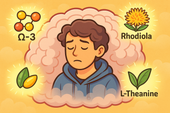
Brain Fog and Body Dysmorphic Disorder: Can Nootropic Supplements Help?
Brain fog often accompanies Body Dysmorphic Disorder, clouding focus and deepening emotional fatigue. Nootropic supplements like L-theanine, Rhodiola, and CoQ10 can help restore mental clarity, balance neurotransmitters, and bring calm energy back to the mind 🌿🧠.
-

How Stress Hormones Like Cortisol May Worsen Body Dysmorphic Disorder
Chronic stress floods the brain with cortisol — the hormone that keeps you on high alert. In Body Dysmorphic Disorder, this chemical overdrive fuels anxiety, distorts self-image, and traps the body in survival mode. Calming cortisol helps restore both peace and perspective 🌿🧠.
-

The Role of Neurotransmitters in BDD—and How Supplements May Help
Neurotransmitters like serotonin, dopamine, glutamate, and GABA shape how people with Body Dysmorphic Disorder perceive themselves. When these brain messengers fall out of balance, perception distorts — but targeted supplements can help restore calm, focus, and emotional regulation 🧠🌿.
-

What Is Body Dysmorphic Disorder? A Deeper Look at the Mind-Body Connection
Body Dysmorphic Disorder (BDD) isn’t just about appearance — it’s about perception. When brain chemistry, trauma, and stress distort self-image, the mind begins to see flaws that aren’t truly there. Healing starts by calming the nervous system and reconnecting mind and body 🪞🧠.
-

Keeping Calm in Competitive Sports: How to Train Your Mind, Body, and Chemistry for Peak Performance
Competitive pressure can overwhelm even the strongest athletes — but calm is trainable. By combining supplements like magnesium, L-theanine, and adaptogens with breathwork and mindset training, you can stay focused, balanced, and in control under any level of stress 🧠🏅.
-

Supplements for Parents Facing Toddler Tantrums: Staying Calm When Little Emotions Run Wild
Toddler tantrums can drain even the most loving parent — but your calm is powerful. With the right supplements like magnesium, L-theanine, and ashwagandha supporting your nervous system, you can stay patient, grounded, and kind, even when emotions run high 🧸🌿.
-

Workplace Stress and Anger Management Support
Workplace stress can quickly turn into frustration — but calm is a skill you can train. By combining supplements like magnesium, L-theanine, and adaptogens with breathwork and mindset tools, you can stay focused, patient, and emotionally grounded no matter how intense the office gets 💼🌿.
-

How to Stay Patient With Family During Stressful Holidays
Holiday gatherings can stir up old stress and test your patience — but calm is possible. With nervous system support from magnesium, L-theanine, and adaptogens, plus mindful breathing and clear boundaries, you can stay centered, kind, and grounded even when family chaos unfolds 🎄💞.
-

Supplements to Keep Calm During Traffic Jams
Getting stuck in traffic doesn’t have to ruin your mood. With calming supplements like magnesium, L-theanine, and ashwagandha, you can train your body to stay relaxed and focused behind the wheel — turning gridlock into a moment of grounded patience 🚗🌿.
-
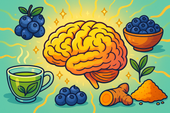
The Role of Antioxidants in Healing Brain Stress from Dissociation
Antioxidants protect the brain from the oxidative stress caused by trauma and dissociation. By neutralizing free radicals and supporting mitochondrial recovery, they help restore clarity, focus, and emotional balance — allowing the mind to heal at the cellular level 🌿🧠.
-
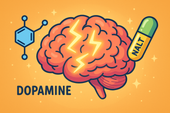
N-Acetyl L-Tyrosine (NALT) for Supporting Mental Clarity
N-Acetyl L-Tyrosine (NALT) fuels dopamine production — the neurotransmitter of focus and motivation. By supporting brain chemistry during stress, NALT helps restore mental clarity, energy, and alertness, making it easier to think clearly and feel present again ⚡🧠.
-

How Ginseng May Improve Focus and Energy in Dissociation
Ginseng helps combat the mental fatigue and fog that often come with dissociation. By supporting mitochondrial energy, balancing neurotransmitters, and regulating cortisol, it gently restores focus, motivation, and emotional presence — helping the mind reconnect with clarity and strength 🌿⚡.
-
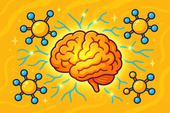
Phosphatidylserine and Dissociation: Supporting Cognitive Function
Phosphatidylserine helps calm the stress response by balancing cortisol, the body’s primary stress hormone. By lowering cortisol spikes, it protects memory, focus, and emotional stability — restoring clarity and mental presence for those struggling with dissociation 🧠🌿.
-
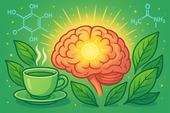
Can Green Tea Extract Help with Dissociative Brain Fog?
Green tea extract may help lift dissociative brain fog by supporting neurotransmitter balance, reducing inflammation, and enhancing energy at the cellular level. With its key compounds EGCG and L-theanine, it promotes calm focus, clarity, and emotional presence — helping you feel more alert and grounded 🍵🧠.
-
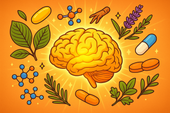
Building a Natural Supplement Stack for Dissociation Support
Building a supplement stack for dissociation means nourishing the brain and body back into communication. By supporting neurotransmitters, gut health, and energy balance through nutrients like magnesium, omega-3s, curcumin, and probiotics, you can help restore clarity, calm, and connection — one layer at a time 🌿🧠.
-

Chamomile and Lavender for Dissociative Anxiety Relief
Chamomile and lavender work together to calm dissociative anxiety by soothing the nervous system and restoring emotional safety. Their natural compounds balance cortisol, enhance GABA activity, and activate the vagus nerve — helping you feel grounded, connected, and at peace again 🌿💜.
-
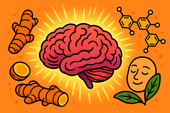
Curcumin for Inflammation and Mental Clarity in Dissociation
Curcumin, the golden compound in turmeric, does more than fight inflammation — it helps clear the mental fog often tied to dissociation. By calming neuroinflammation, balancing neurotransmitters, and supporting mitochondrial energy, curcumin can restore mental clarity, focus, and emotional presence 🌿🧠.
-
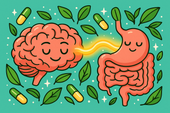
Probiotics and Dissociation: Exploring the Gut–Brain Axis
The gut–brain axis plays a vital role in emotional awareness and presence. When the microbiome is balanced, it supports serotonin production, vagus nerve activity, and calm focus. Probiotics help repair this connection — restoring safety, clarity, and the feeling of truly being in your body again 🌿🧠.
-
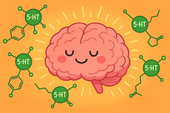
5-HTP for Dissociation: Supporting Serotonin and Emotional Stability
5-HTP helps bridge the gap between emotional numbness and stability by supporting serotonin production — the neurotransmitter that shapes mood, sleep, and sensory awareness. For people experiencing dissociation, 5-HTP may gently restore connection, presence, and emotional balance from the inside out 🌿🧠.
-
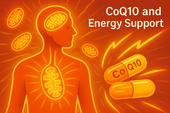
CoQ10 and Energy Support for People with Dissociation
Chronic dissociation often leaves the body running on empty — tired, foggy, and disconnected. CoQ10 helps recharge that system at the cellular level by restoring mitochondrial energy, reducing oxidative stress, and supporting the brain’s capacity to stay present. It’s energy medicine for both body and mind ⚡🧠.

















































